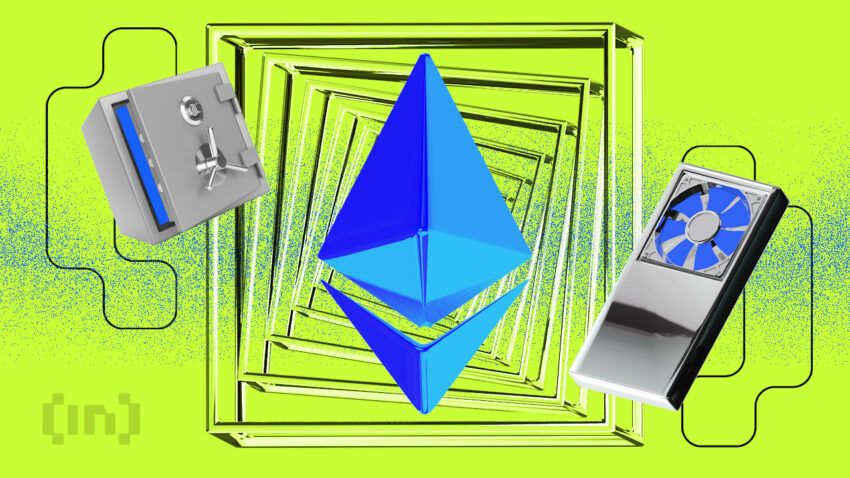Ethereum developers said in a blog post following the 157th AllCoreDevs Execution Layer meeting that withdrawals of staked ETH would occur on April 12, 2023.
The upgrade is the final stage that will allow Ethereum’s proof-of-stake network validators to unstake ETH previously locked in a smart contract on Ethereum’s Beacon Chain.
Ethereum Shapella Upgrade Will Change Consensus, Execution, and Engine Layers
The announcement comes after developers successfully deployed the Shapella forks on the Goerli and Sepolia testnets.
The last upgrade, the Merge, which merged the Beacon Chain with the Ethereum Virtual Machine (EVM), changed Ethereum’s consensus mechanism from proof-of-work to proof-of-stake.
The Shapella upgrade combines changes to Shanghai Ethereum Virtual Machine called Shanghai and the consensus layer called Capella. It also includes changes to the Engine API that links the two layers.
In addition to enabling withdrawals, Shapella implements the following Ethereum Improvement Proposals: EIP-3651, EIP-3855, EIP-3860, EIP-4895, and EIP-6049. EIPs are standards that designate potential features or new processes for Ethereum.
The new consensus mechanism uses validators instead of miners to confirm transaction blocks and broadcast them to the Ethereum network.
Initially, validators wishing to secure the network could stake or lock up 32 ETH in a smart contract on the Beacon Chain to earn rewards on their staked ETH.
Some investors wishing to keep their ETH liquid could instead stake their assets in a liquid staking protocol. These protocols allow investors to earn ETH rewards from validators confirming transactions. In addition, they receive a liquid version of their staked ETH that they can make returns with using various DeFi protocols.
Rollup Foreshadow Danksharding Scalability Upgrades
While the Shapella upgrade represents a significant milestone for the Ethereum network, it still suffers from low transaction throughput. Recent data from Blockchair pegs Ethereum’s transaction capacity at around 10 transactions per second.

While work is underway to introduce upgrades that would significantly boost transaction speeds through a process called danksharding, Ethereum.org reveals that it may be several years before this upgrade takes place.
Accordingly, Ethereum co-founder Vitalik Buterin predicted that, in the short to medium term, a path to greater transaction speeds would occur through rollups.
Rollups ease transaction bottlenecks on the main Ethereum network by performing most computations themselves and then sending out reduced data through the main chain.
Zero-Knowledge Rollups Gaining Popularity
One particular flavor of rollups is zero-knowledge systems that generate cryptographic proofs that transaction batches are valid. These zk-rollups have node operators that submit validity proofs to change the rollup state on the main Ethereum chain. This change of state corresponds with the finality of a transaction batch.
On March 28, 2023, the developer of the self-custodial wallet MetaMask ConsenSys, announced the launch of a new zero-knowledge EVM testnet called Linea. Since Linea’s private beta launch, the network reportedly processed 1.5 million transactions.
According to ConsenSys, developers of decentralized applications on Ethereum’s mainnet can create apps with scalable transaction throughput on Linea without rewriting smart contracts.
Linea appears as the default testnet extension on MetaMask.
Ethereum sidechain Polygon recently announced the public beta of its zero-knowledge scaling solution. The team at Polygon invited Buterin to conduct the first transaction on the network. Buterin obliged by sending 0.005 ETH to an arbitrary address. Polygon claims that over 50 firms have committed to building decentralized apps on its new rollup.
Last Friday, Matter Labs launched a new zero-knowledge network called zkSync Era in Alpha. The rollup has reportedly onboarded wallet Argent and algorithmic stablecoin Frax.
For Be[In]Crypto’s latest Bitcoin (BTC) analysis, click here.
Disclaimer
In adherence to the Trust Project guidelines, BeInCrypto is committed to unbiased, transparent reporting. This news article aims to provide accurate, timely information. However, readers are advised to verify facts independently and consult with a professional before making any decisions based on this content. Please note that our Terms and Conditions, Privacy Policy, and Disclaimers have been updated.


